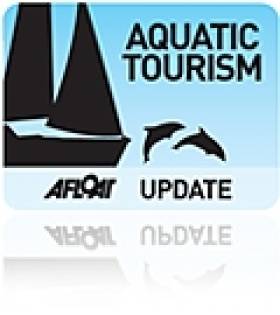Displaying items by tag: YHA
#marina – Kinsale Yacht Club (KYC) marina, recently announced as the starting point of the new tourism initiative, "The Wild Atlantic Way", has been awarded Five Gold anchor accreditation by the International Yacht Harbour Association (YHA).
The Atlantic way is set to be Ireland's first long-distance touring route, stretching along the Atlantic coast from West Cork to Donegal. Kinsale Yacht Club is delighted that this announcement coincided with their achieving the much coveted 5 Anchors award for their recently upgraded marina.
Thus KYC is now poised to play an important role for all of those intending to cruise the Wild Atlantic Way.
"Over the last three years KYC invested a lot of resources and time into the marina ensuring that we are providing a top quality service to the visitor. Our efforts have now been rewarded, KYC rear–commodore told Afloat.ie
The 5 Anchors Award is an international standard for marinas that offer excellent facilities and a very high level of service to members and visitors. It also incorporates the ICOMIA clean marina standard which is fitting for the commencement point of the Wild Atlantic Way.
Kinsale has evolved from a Medieval fishing port and is today central to the "Cruising Hub of Ireland". Visiting yachts use it as an ideal location to start and finish their cruises along the beautiful South West coast of Ireland. The natural harbour is renowned for its beautiful scenery and is situated approximately 12 miles south west of Cork harbour entrance. Kinsale is 120 nautical miles from Wales, 240 nautical miles from northwest France and 500 nautical miles from the Galician coast of northern Spain.
The Kinsale Yacht Club marina offers the single largest berthage to visiting yachts in Ireland.
There is150 meters of dedicated marina space. It also caters for deep draft vessels proving popular with Superyachts.
In 2013 Kinsale Yacht Club completed major renovations to its Club House. It now offers state of the art, wheelchair accessible facilities; including a laundry room, Inhouse dining and an extended balcony, enabling visitors to relax and enjoy the breathtaking vista
of Kinsale Harbour.
The Marina is located in the heart of the town of Kinsale close to cafes, shops, a wide choice of restaurants and pubs. Kinsale is regarded as Ireland's Gourmet capital and is an essential stop on the tourist trail. The town is situated 20 minutes from Cork International airport and boasts excellent tourism and marine facilities. It is world renowned for the welcome it extends to its maritime visitors.





























































